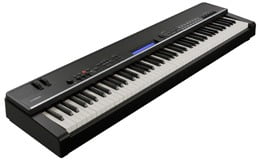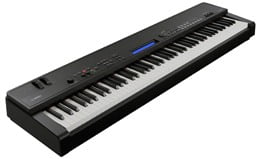Digital pianos are the perfect instrument when you want versatility of sound in a small footprint. Yamaha is known for making quality pianos, both acoustic and digital. Let’s take a look at three popular models to see which one is the best fit for you.
Yamaha CP4 Stage Piano with Natural Wood Keys and Sustain Pedal

The Yamaha CP4 has an 88-key full-size keyboard with natural wood keys coated with synthetic ivory, all with weights and sensors so it feels like an acoustic piano when you play. The weighted system is called “graded hammer action,” so the lower keys require a heavier touch. The CP4 also has damper sensors to accurately reproduce repeated keystrokes.
There are three acoustic piano samples to choose from—you can make the CP4 sound like a Yamaha S6, CFIII, and the CFX. The new CFX sound (considered “new” because this sample wasn’t available in earlier digital pianos) will make you think you’re enjoying a concert grand piano.
But the CP4 doesn’t just imitate acoustic pianos, it can sound like a clavinet, harpsichord, electric piano, organs, strings, choirs, and more. You can edit the voices and the quality of their sounds to suit your musical inspiration by simply using the Edit button and menu on the LCD display. You can also adjust sound using the 5-band equalizer. And if you’re concerned about accidentally changing a setting during a performance, you can lock the panel buttons temporarily. There is just one downside to changing sounds—if you change in the middle of a song, the sound drops out for a moment until you play the new sound.
The CP4 is also versatile with respect to digital input and output. It has XLR jacks plus USB connectivity. You can use the stereo input to attach an iPad with Yamaha’s app or other software so you can bring in external audio files. The CP4 can record to and playback from an external USB drive, and control external MIDI devices.
More features of the Yamaha CP4stage piano:
- Comes with FC3 pedal, and compatible with other pedals sold separately
- Requires headphones or external speakers
Yamaha CP40 Stage Piano with Weighted Keys and Sustain Pedal

The Yamaha CP40 has a smaller sound library than the CP4, and it doesn’t have the CFX grand piano voice. But it does have 297 modern and vintage piano sounds, including strings and basses, the CFIIS grand and the CP80 electric grand, 34 other vintage electric voices, and 15 CFIII voices. These are all based on Yamaha’s MOTIF synth program.
Like the CP4, the CP40 has a full-size 88-note graded hammer keyboard and 128-note polyphony. It can control external MIDI devices, output through the XLR ports, and read and write to USB drives or to an iPad. You can edit sounds with the 3-band equalizer and choose effects like reverb and chorus.
At 36 pounds, the CP40 weighs slightly less than the CP4, but they are the same size. It has a 40-character, two-line LCD display, and requires external speakers or headphones.
More features of the Yamaha CP40stage piano:
- Comes with FC3 foot pedal for half-dampering, and compatible with a sustain pedal sold separately
Yamaha P255 88-Key Weighted Action Digital Piano with Sustain Pedal, Black

The Yamaha P255 has a built-in 15W x 2 speaker system and with a full-size keyboard. Each of the 88 keys has a synthetic ivory top and is graded hammer weighted for realistic play and feel. Instead of three sensors on each key, it only has two, but that is still very good for a digital piano at this price range.
The P255 comes with a piano-style sustain pedal that’s very good at reproducing realistic-sounding note decay time, but can’t do half-pedaling. Yamaha sells a different pedal that can provide this feature.
It’s convenient that the P255 has powerful speakers that sound good. They are mounted on the rear of the keyboard. You won’t need external amps like you would with the CP4 or CP40. You can also enjoy listening to the piano with headphones. The USB connectivity allows you to record to an external drive, but is limited to reading the files you record.
Another bonus to the P255 is the better memory chip. It has 256-note polyphony, not just 128-note like the other two pianos. This allows you to play two sounds together, or record two sounds and layer a third sound live over the top.
There are 24 instrument sounds available, and you can split them for left hand and right hand play. But if you switch from piano to another instrument sound, the piano sound drops out until you play the first note of the new sound. And should you try to sustain a choir or organ sound with the sustain pedal, they still decay like the piano sounds.
The LED display on the P255 is another less stellar part of the piano. It’s very small and it’s difficult to decipher what function you’re trying to use by glancing at it. On the other hand, if you have an iPad, you can use the Yamaha P-255 controller app to manage the piano very easily.
More features of the Yamaha P255 digital piano:
- Comes with sustain pedal
Recommendation
If you want to have a digital piano that comes ready to play, you may prefer the Yamaha P255. It has built-in speakers that provide a total of 30W of sound. The keyboard is made to feel and sound like you’re playing an acoustic piano. The 256-note polyphony is superior to the memory chips on the other models. The main challenge is navigating options with the tiny LED display if you don’t use the Yamaha iOS controller app.
If you want a more compact digital piano that offers realistic sound and feel, is easy to take on the road, and won’t break the bank, consider the Yamaha CP40. It has a wide selection of voices and easy to use controls, plus a 3-band equalizer.
If you want a richer selection of voices and sounds in a compact digital piano, take a look at the Yamaha CP4. It has gorgeous sound and realistic play, even imitating the famous Yamaha CFX acoustic concert grand piano and an assortment of vintage effects.
Click here to purchase Yamaha CP4 on Amazon.com!
Click here to purchase Yamaha CP40 on Amazon.com!
Click here to purchase Yamaha P255 on Amazon.com!